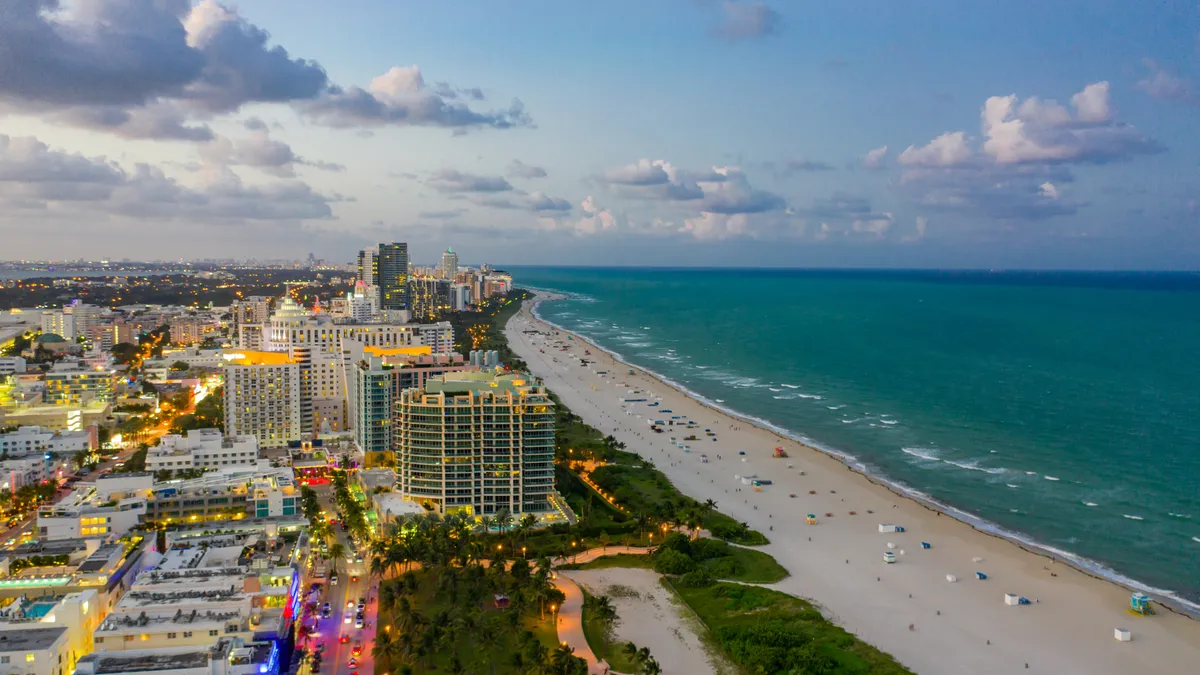Dive Brief:
- The city of Miami Beach, Florida, will try using noise-detecting cameras to clamp down on cars that blare high-volume music or are equipped with loud, modified mufflers.
- The city commission voted unanimously this month to authorize city officials to install noise cameras on utility poles that read the sound levels of passing cars and takes a photo of their license plate when in violation of excessive noise laws.
- Miami Beach Commissioner Steven Meiner, who introduced the noise camera pilot, said the city is considering using technology from British company 24 Acoustics. While the terms of the pilot have not yet been sorted out, city officials may send warnings to violators and use data collected from the cameras to determine the areas of the city where police can best crack down on violators.
Dive Insight:
Miami Beach is one of several cities in the U.S. and Europe to utilize noise cameras to crack down on noisy vehicles.
Knoxville, Tennessee, also turned to noise cameras earlier this year to address noise complaints stemming from loud vehicles with modified mufflers. The New York City Department of Environmental Protection also implemented a similar noise camera program earlier this year — using the technology to issue fines to vehicles that register at or above 85 decibels at a distance of 50 feet or more. London and Paris have also utilized the technology.
Meiner said the city attracts a large number of tourists, bringing cars that often drive through neighborhoods throughout the night, emitting loud music or modified muffler noises that sound like “gunfire” as they drive by, waking up and startling residents.
“It wakes people up, it startles babies,” said Meiner, who characterized it as a health issue. The city has an ordinance on the books that ban “unreasonably loud, excessive, unnecessary or unusual noise,” however police cannot be everywhere to enforce it, he said.
Public health experts also consider excessive noise as a public health issue and a United Nations Environment Programme report recently outlined physical and mental health detriments from urban noise pollution as a top emerging environment threat.
Scott Sommerfeldt, an acoustics professor at Brigham Young University, said that increased noise levels lead to hearing loss and a number of other undesirable health outcomes. The new technology, he said, could potentially help improve noise levels in cities. However, the volume of noise emitted from traffic congestion would still equal the noise coming from one vehicle that is excessively loud, so it would not solve all issues.
“No question we would do better, both emotionally and physically if we could bring down noise levels in this country, particularly in large city areas,” Sommerfeldt said.
A controversial Florida law recently went into effect allowing police to issue tickets if a car emits loud music that can be heard from 25 feet away.
During the July 8 Miami Beach commissioner meeting, city officials said the law doesn’t give the city the authority to issue tickets for violations captured by noise cameras, and fines would need to be issued by police officers themselves. However, Meiner said the city could issue warnings to violators identified by the cameras and the data collected by the technology could allow police to determine if there are serial offenders and where the biggest problem areas throughout the city are located so they can better target their enforcement.
The commission vote authorized the city to launch the pilot but officials have not yet worked out its scope or timeline. Meiner said each camera ranges in price from $25,000 to $30,000 but 24 Acoustics is allowing the city to use one for a month for free and cities can rent them as well.












